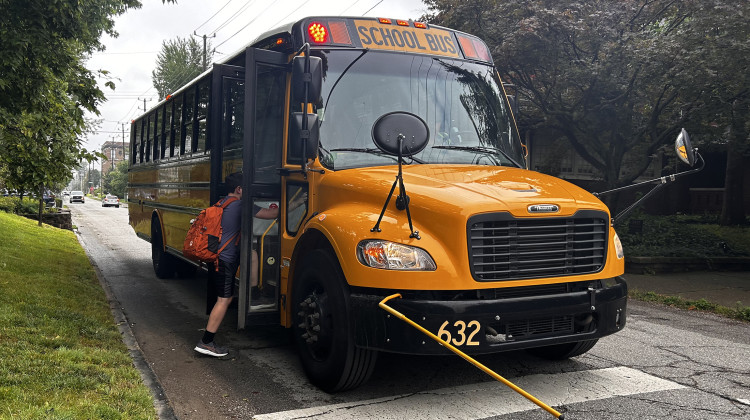
The Indianapolis-based Martin University will forgive some students’ debt by using over $600,000 in federal pandemic relief funds.
Eric Weddle/WFYIMartin University, Indiana’s only predominantly Black higher education institution, will clear past-due account balances for roughly two-thirds of its students.
This comes at a time when more than 20 historically Black colleges and universities across the country are cancelling student debt that accumulated due to the COVID-19 pandemic, in order to encourage them to continue their education. Martin University was founded in 1977 and is not a historically Black university.
The majority of the 200 Martin students who will have debt forgiven are continuing students who haven’t registered for classes, or dropped out of school due to financial hardships related to the COVID-19 pandemic.
Sean Huddleston, president of the Indianapolis-based university, said the funds will help students who struggle to afford college expenses.
“Our students certainly take advantage of all of the financial aid that is available to them,” Huddleston said. “But then sometimes the financial aid that’s available through [the] federal government is not enough to cover the cost of attendance.”
Martin University will forgive students’ debt by using over $600,000 in grants received from the Higher Education Emergency Relief Fund III, which was distributed through the Coronavirus Aid, Relief, and Economic Security Act.
Annual tuition at the private, not-for-profit university is $13,200. Students at the university have qualified for Pell grants, federal student loans and other aid, according to the National Center for Education Statistics.
Timothy Taylor is one of the students selected to have his debt cleared. The senior liberal arts major and congregational pastor unenrolled from the university in December 2019 because he had at least $4,000 worth of debt and he didn’t want to take on additional debt with new student loans.
Taylor planned on going back to school in the summer, but once the COVID-19 pandemic hit, that changed everything. When school districts switched to online learning, Taylor lost his second job as a mentor in local schools -- which allowed him to pay for his classes. And because of his income, he said he doesn’t qualify for state or government funding.
Taylor registered for classes as soon as his debt was removed. He hopes to finish his degree by next spring.
“Words cannot even explain what it means to me because I've had this goal for a long time,” Taylor said. “ I started college out of high school, and then I started working jobs and making good money. Then I went back a few times, wanted to finish, but life happened. Got married, had children -- putting the children through college.”
Taylor and Huddleston encouraged students to take advantage of this opportunity to re-enroll in school without debt. Both see it as a way for students to receive an education and find a pathway out of poverty.
“I hope it is a game changer for our students,” Huddleston said. “But I think it also opens up the doors and the possibilities for us to go further than just the pandemic, and find ways to be able to reduce debt that students might have to incur to get a valuable and important and high quality college degree.”
The university is also piloting a new, paid apprenticeship program this month called Martin Works, which Huddleston hopes will prevent students from having to take out loans in order to pursue higher education.
Contact WFYI education reporter Elizabeth Gabriel at egabriel@wfyi.org. Follow on Twitter: @_elizabethgabs.
 DONATE
DONATE






 Support WFYI. We can't do it without you.
Support WFYI. We can't do it without you.